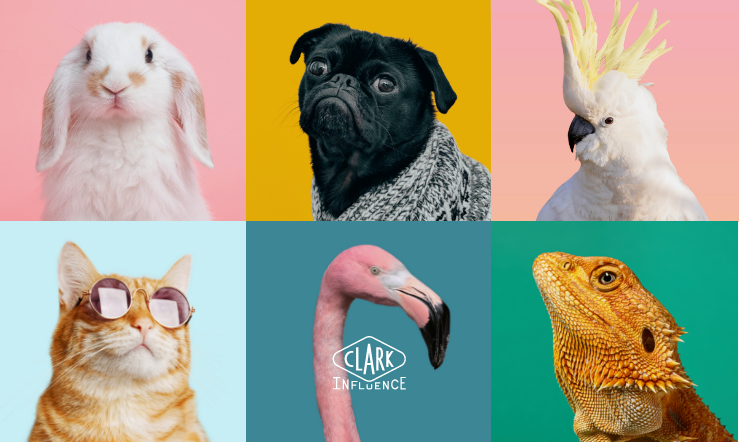What does the rise of petfluencer marketing mean for brands?
- Alexia Saumon

- Nov 10, 2022
- 4 min read
Updated: Nov 30, 2025

They are called Maple, Blu, Bandit, Mason, Sterlin, or Colin. They are some of the most influential TikTok and Instagram Canadian petfluencers - short for pet influencers. Hundreds of individuals engage with their often-cute-and-sometimes-funny content on social media daily. It makes sense, right? Scroll. Inflation. Scroll. Global pandemic. Scroll. Increase in Gas price. Scroll. War in Ukraine. Scroll. Is there a better cure for seasonal depression than watching TikTok videos of cute pups in their Halloween outfits?
The number of pets being adopted has tremendously increased since the beginning of the pandemic. In 2022, more than 73% of households in Canada owned a pet. More precisely, the Canadian Animal Health Institute (CAHI) shared that Canadians, as of 2022, own 7.9 million dogs and 8.5 million cats. And pet owners are willing to spend a big cut of their disposable income on caring for their furry friends. The annual cost of caring for a dog has been reported by Statista to reach $3,999 annually, mostly spent on food, pet insurance, and professional dental care. Luckily for them, owning a pet in 2022 can turn out to be lucrative, to say the least. The New York Post reports that in 2022, top petfluencers could make $15,000 or more in revenue per post. The main reason is, of course, that any pet is significantly cuter than its human parents (sorry, humans). Rightfully, an increasing amount of pet owners are looking to get a piece of that pie, with 1 in 4 pet owners trying to turn their furry flatmates into social media stars.
The late Tardar Sauce, commonly known as the Grumpy Cat, had reached a net worth of $100 million before his tragic death in 2019. For transparency purposes, I feel the need to report that I did Google “where to adopt a dog close to me” after reading about that stat. Brands, and not only those in the pet food vertical, are increasingly leveraging the petfluencers’ engaged communities. They operate in numerous industries such as consumer product goods, fashion, retail, tourism, NGOs, insurance and automotive, amongst others. Engaging animals seems to be working, with a reported 337% increase in posts likes of brand posts featuring cats or dogs.
So, how could brands leverage these new infurryencers to maximize engagement and reach new customers? Here are some tips to consider when choosing the right petfluencer for your brand:
1. The right platform
First and foremost, your brand should carefully analyze through which channel your target consumers should be reached. Whether it is Instagram, Pinterest, or TikTok, there is a petfluencer for everyone. And the good news is that engagement on petfluencers posts are reportedly higher than on traditional ones. Animal content is the second most engaging category on TikTok, right after humor content… what if both were merged?!
2. The right animal
It’s not only about cats and dogs anymore. A large array of animals have made their way into social media platforms. From snakes to ducks, pigs, frogs, parrots and even hedgehogs, social media has become an animal paradise. It is crucial to find the right type of fur to best represent your brand!

3. The right petfluencer
From the "embodied" petfluencer to the pet of an influencer with a strong reputation, the spectrum of petfluencing usage is wide. Just like human influencers, petfluencers are classified into different buckets depending on the number of followers on their platforms. Petfluencers can either be nano (0– 1,000 followers), micro (10–50 thousand followers), macro (500 thousand – 1 million followers) or mega (+1 million) influencers. Each category serves different types of objectives. If your brand is looking for short-term conversions - increase in sales, app download, etc, your should partner with petfluencers having smaller follower bases. On the other hand, if you are launching a new product, entering a new market, or a new customer base, and thus looking to increase awareness, you should go with bigger accounts with lots of followers.
4. The right content
In an increasingly competitive petfluencer space, being cute is no longer enough. Working in close collaboration with the petfluencer and their human managers, you should think out of the box and create content that stands out, both creatively and in terms of messaging used. The options are limitless, from long and short videos to stories, and static images. Examples include the creation of contests, live videos and Q&A sessions with followers, duets on TikTok, etc.
While the number of pet stars is increasing online, the success of a petfluencer campaign is not always a given. Your brand has to make the right choices both before, during, and after the campaign. Crucial questions you should ask yourself as a brand marketer looking into petfluencing are: what is this petfluencer’s level of trust? Is this pet relevant to my brand? What is this pet’s volume of content posted? Are his followers loyal?
I know, there was a lot of information. Luckily, here at Clark, we are influence specialists. We can help you navigate and understand the petfluencer industry and help you throughout the entire petfluencer campaign workflow. Our expertise includes determining KPIs, budget & targets, determining the marketing channels & timeline, matching your brand with the most relevant petfluencers, managing their briefing, negotiating rates and contracts, reviewing content, and delivering reporting and analysis of brand success.
Need help designing or executing your petfluencer campaign?
Contact us: info@clarkinfluence.com


